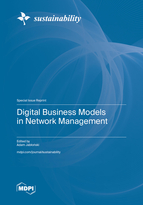Digital Business Models in Network Management
A special issue of Sustainability (ISSN 2071-1050). This special issue belongs to the section "Economic and Business Aspects of Sustainability".
Deadline for manuscript submissions: closed (31 August 2023) | Viewed by 95747
Special Issue Editor
2. OTTIMA Plus, 40-594 Katowice, Poland
Interests: business models; strategic management; sustainable business; performance management; social and digital economy; railway transport
Special Issues, Collections and Topics in MDPI journals
Special Issue Information
Dear Colleagues,
The digital economy creates new conditions for creating entrepreneurial solutions. Technology determines the emergence of innovative business models, the existence of which would not be possible without the potential of such technologies. The unlimited ingenuity of contemporary entrepreneurs is currently focused on the search for innovative solutions in the sphere of using the opportunities offered by digital technology. Previous solutions that use the traditional channels of economic activity are replaced with proposals stemming from resources based on the Internet and information and communication technologies. This gives one an opportunity to design business initiatives whose impact, in many cases, allows one to reach a level of global impact in a short time. The economics of the digital economy are the factors that stimulate the emergence of business models in the digital economy. These include ideas such as the sharing economy, the remix economy, the access economy, the creative economy, the reputation economy, the gift economy, the experience economy, the collaborative economy/wikinomics, and the trust economy.
The concepts presented have had a key impact on the profound changes not only in business but also in particular in society in terms of a new approach to understanding business and work processes. Building communities based on communication platforms also allows for their commercialization and capitalization, while creating opportunities to obtain desired environmental, economic, and social effects. It should be noted that the development of new paradigms in the science of management and economics results from transformations in the global economy, where ideas and concepts arise in various places, often thanks to global access to information and knowledge through technological, Internet-based platforms. This is the most crucial assumption of this Special Issue.
This Issue requires extensive research and analysis.
On the basis of the above-mentioned assumptions, the key issues to answer are the following:
- What is the best way to understand digitalization in the context of business models?
- What is the best way to build and operationalize digital business models?
- What is the best way to use new concepts of the economy to build effective business models?
- What is the best way to use the network approach to build digital business models?
- What is the best way to achieve the network effect for building effective digital business models?
- What is the best way to manage communities in digital business models created?
- What is the best way to implement the sustainability concept in digital business models?
- What is the best way to build digital models of sustainable business?
References:
- F. Vendrell-Herrero, G. Parry, O. F. Bustinza, E. Gomes, Digital business models: Taxonomy and future research avenues, Strategic Change. 2018;27(2).
- K. Lenkenhoff, U. Wilkens, M. Zheng, T. Süße, B. Kuhlenkötter, X. Mi, Key challenges of digital business ecosystem development and how to cope with them, Procedia CIRP 73, 2018.
- K.Tauscher, S.M. Laudien, Understanding platform business models: A mixed methods study of marketplaces, European Management Journal 36 (2018).
- F. Li, The digital transformation of business models in the creative industries: A holistic framework and emerging trends, Technovation (2017), https://0-doi-org.brum.beds.ac.uk/10.1016/j.technovation.2017.12.004.
Assoc. Prof. Adam Jabłoński
Guest Editor
Manuscript Submission Information
Manuscripts should be submitted online at www.mdpi.com by registering and logging in to this website. Once you are registered, click here to go to the submission form. Manuscripts can be submitted until the deadline. All submissions that pass pre-check are peer-reviewed. Accepted papers will be published continuously in the journal (as soon as accepted) and will be listed together on the special issue website. Research articles, review articles as well as short communications are invited. For planned papers, a title and short abstract (about 100 words) can be sent to the Editorial Office for announcement on this website.
Submitted manuscripts should not have been published previously, nor be under consideration for publication elsewhere (except conference proceedings papers). All manuscripts are thoroughly refereed through a single-blind peer-review process. A guide for authors and other relevant information for submission of manuscripts is available on the Instructions for Authors page. Sustainability is an international peer-reviewed open access semimonthly journal published by MDPI.
Please visit the Instructions for Authors page before submitting a manuscript. The Article Processing Charge (APC) for publication in this open access journal is 2400 CHF (Swiss Francs). Submitted papers should be well formatted and use good English. Authors may use MDPI's English editing service prior to publication or during author revisions.
Keywords
- Digital Economy
- Business Model
- Digital Business Model
- Network Management
- sustainability management
- sustainable business model
- sharing economy
- remix economy
- access economy
- creative economy
- reputation economy
- gift economy
- experience economy
- wikinomics
- trust economy






